We recently talked in detail about the Finns' successes in this series.
Now let's see how the home team managed to fight back.
The PGT PLO Series Grand Final with a $25,200 buy-in attracted 72 entries. The prize fund was $1,800,000.
Seven people reached the final table:
Bruno Furth – 3,490,000
Seth Davies – 2,955,000
Samuli Sipila – 2,515,000
Sean Winter – 1,800,000
Stefan Christopher – 1,685,000
Joao Simao – 995,000
Allan Le – 955,000
Blinds 15,000/30,000, BB ante 30,000
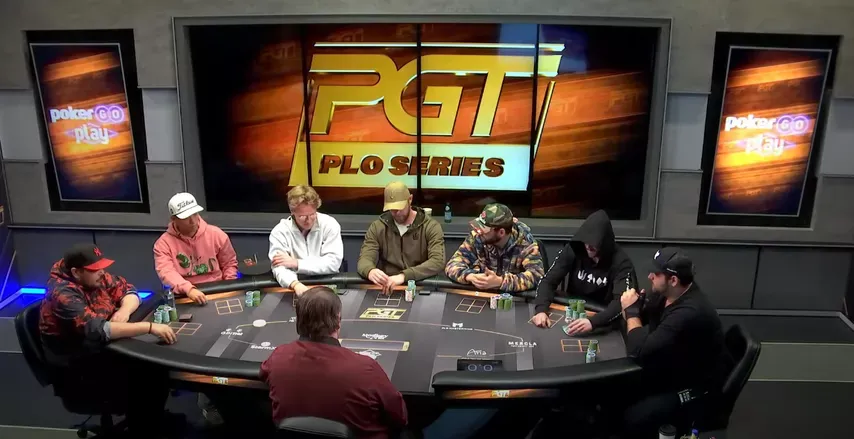
Reaching the final table ensured Samuli's victory in the overall series standings – before that, he already had three finals and two victories.
In the first hand, Sipilya attacked Davies' big blind from the small blind with a very strong hand. Davies had good cards, but bad suit spread, and called.
The dealer created a rather unpleasant setup.
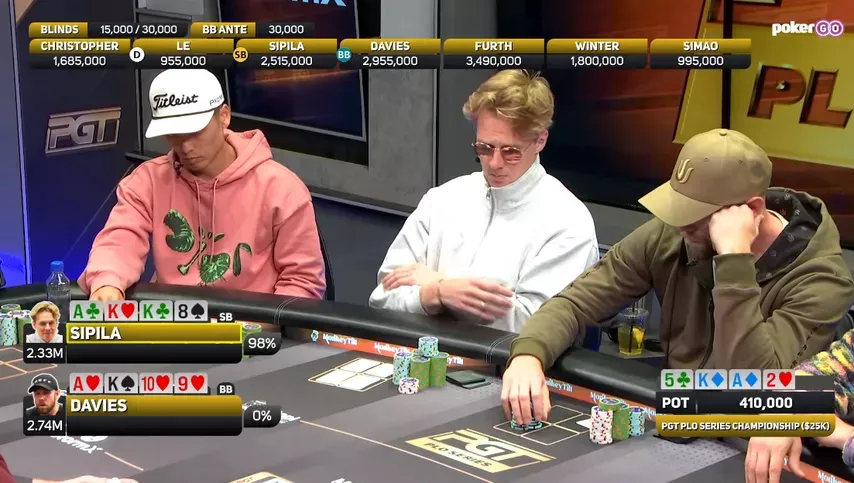 There was a c-bet of100,000 and call the flop
There was a c-bet of100,000 and call the flopOn the turn, the Finn bet 325,000 into a pot of 410,000. Davies called.
On the river , the straight draws got there, but not the flush draws. Would you go for a bet in Sipil's place, and if so, what sizing? He bet big, 800,000, but didn't get a call.
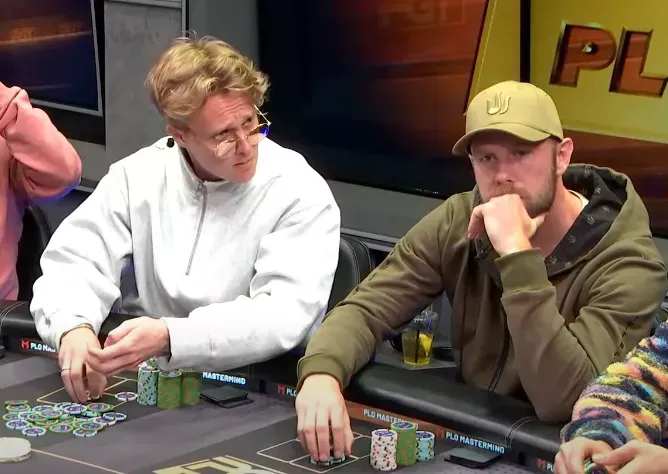
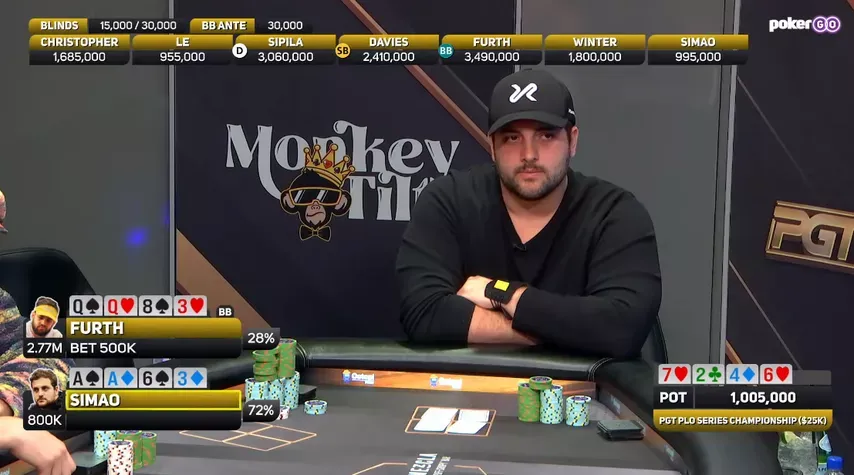
Here is an example of an enterprising game by a chip leader. The short stack, Joao Simao, opened from the top of his range and got two calls from the blinds.
On a very dry flop, he didn't bet the full pot, as one would expect, but about half, and Bruno Furth, with an overpair and only two straight outs, decided to see a turn. The turn card produced several straights, each of which could have been in the range of the chip leader preflop, and Bruno turned his hand into a bluff, betting the full pot. To be on the safe side, he got a flush draw for some extra outs.
Simao thought about it. He spent a lot of extra time cards, but they didn’t bring much relief.
“Of course, this is a very unorthodox line,” said Fernando Habegger, who joined the commentary. – I'm also wondering if he's willing to call the shove. However, the fact that Simao thinks for so long tells his opponent that he does not have a strong hand.
After thinking for about two minutes, the Brazilian made a call, leaving about 300,000 behind.
Another potential straight draw got there on the river – . Furth instantly put his opponent all in.
Remko Rinkema shared his observation. “Nobody likes to get busted after calling an all-in with one pair – it looks pretty stupid in Omaha”.
And if you fold, yes, he will be short, but he will have 10 blinds...
Simao thought again for about two minutes and folded the cards.
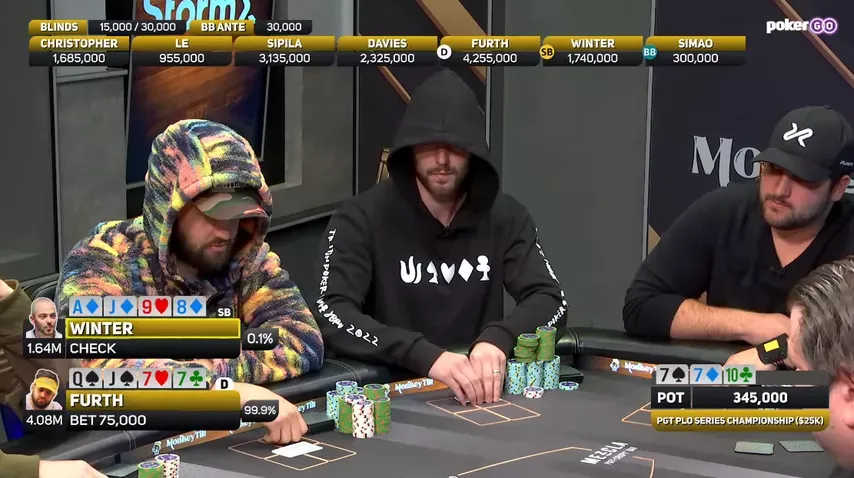
Shawn Winter called a continuation bet on the flop, but on the turn , confidently threw it away for a very small bet.
– I want to tell a story about Sean.
A couple of days ago we stayed in the blinds with him. He opened-folded from the small blind and I showed him my hand, which was pretty weak. “If I limped, would you raise?” – Sean asked me. I replied that I would check next. “You know, I’m sure this is a raise,” he disagreed.
At home, I checked this situation in the solver – and it really was a raise! Moreover, I am absolutely sure that it does not work with programs. And who even specifically works on blind-to-blind ranges in 10bb stacks with antes? This player just has frightening poker intuition,” JNandez shared his observations.
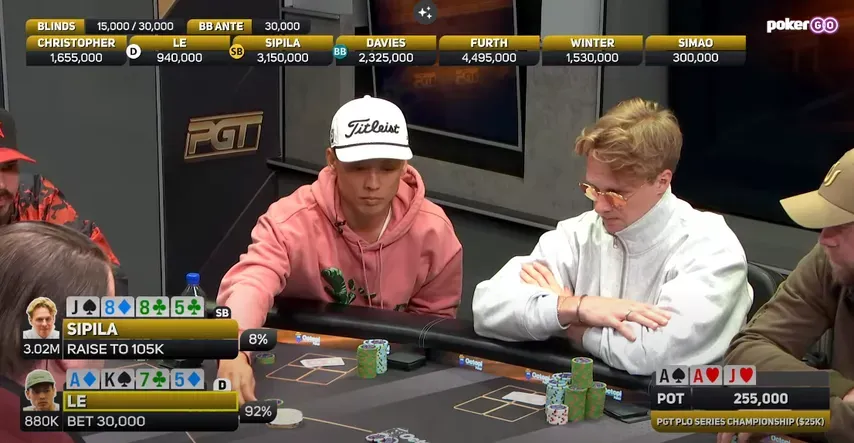
In a limped pot, Sipila tried to put pressure on the short stack, but quickly gave up when he got called. (He check-folded the blank turn.)
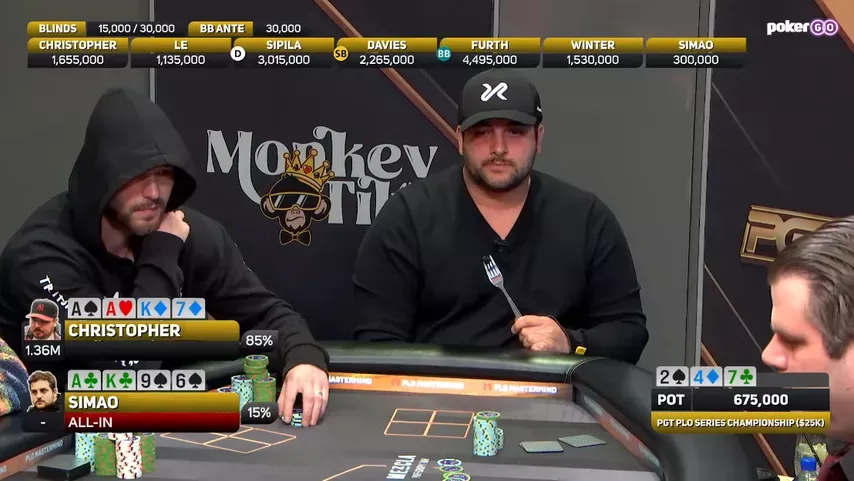
A standard pre-flop all-in with these stacks, Joao Simao receives $72,000 for 7th place.
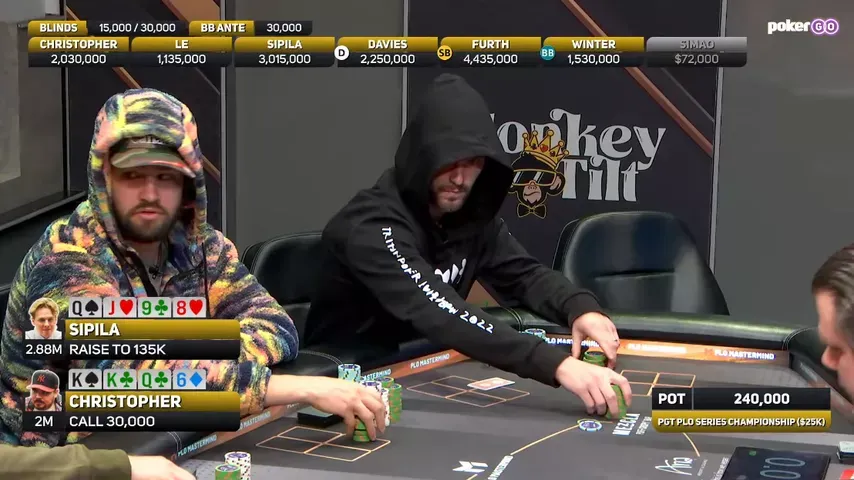
Sean Winter 3-bet 450,000 from the BB. Christopher folded and Sipila called.
On the flop, Sean bet the full pot, leaving just over 500,000 behind. Sipila quickly moved all-in and got called.
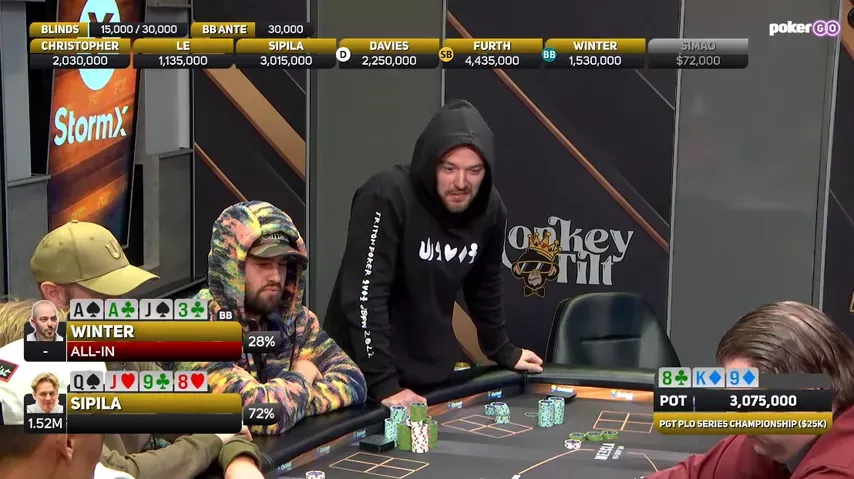
The turn came with an eight, giving the Finn a full house. Two outs on the river failed to open, and Shawn Winter left the tournament in 6th place for $90,000.
Using this hand as an example, we can discuss the butterfly effect in poker. If Christopher had raised instead of limping or Sipila had limped instead of isolated, the result in each case would have been completely different.
Editors note – Could you start a butterfly effect from a freeroll or micro-stakes tournament? There's one way to find out. Browse our schedule of free poker tournaments or check the reviews of several prime places to play.
Chip leader strategy in the big blind:
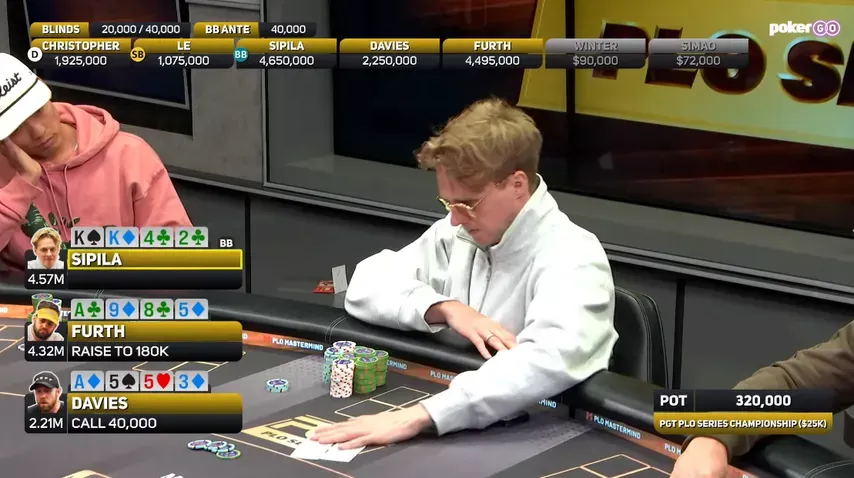
It seems that when a limp and raise come to us, we can call with a high pair (take into account that there is an ante in the game). However, very bad sidecards and the possibility of a limped 3-bet quickly swayed the Finnish player to fold.
Seth Davies called and folded to a delayed continuation bet on the board .
Chip leader strategy:
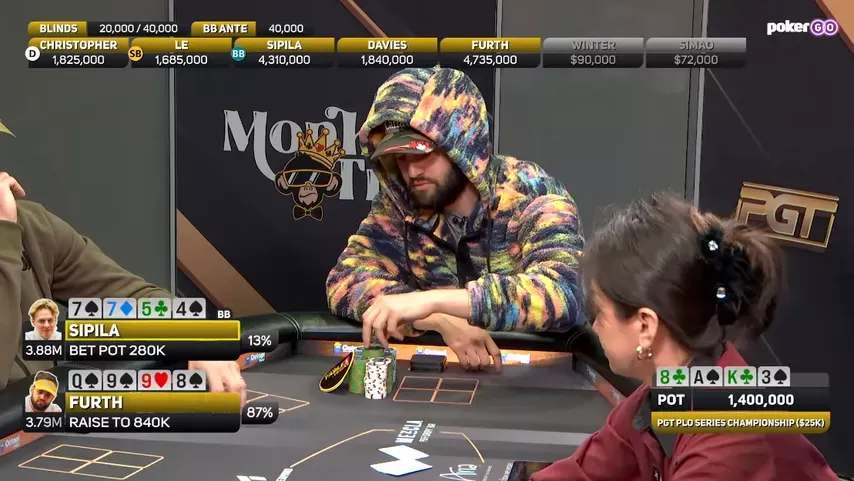
Furth, having significantly expanded his opening range, once again attacked the entire table with questionable cards. Sipila was defended by BB.
The flop was checked. On the turn, Sipila bet the full pot, apparently believing that his opponent did not have a set or a strong ace, otherwise he would have bet the flop. If Furth had called here, he would have had to fold on most rivers if his opponent had bluffed. In addition, taking a three-card flush draw is against the odds here, and it’s not the nuts.
Instead of folding, however, Furth raised, not caring that he wasn't showing anything. His stack looks too menacing! And it worked – Sipila bluffed and quickly folded his cards.
– Very interesting! Bruno didn't play according to the script! Sami must have been very surprised,” Nandez commented. – Few people use the line “check the flop in position, raise the turn” on cards that do not change the nuts.
Nandez's philosophical digression:
– People in relation to bluffs are divided into two types. The former bluffs when they have good blockers, and this makes sense from a theoretical point of view. Their bluffs are strategic. The latter bluff when they feel that a bluff is ripe: a terrible board, a suitable opponent, dynamics, and so on – in general, a good spot. These are tactical bluffs.
Bruno also knows strategy, but he clearly prefers tactical bluffs. Such opponents are very dangerous, but they can be exploited. They constantly balance on a very fine line and sometimes lose their balance.
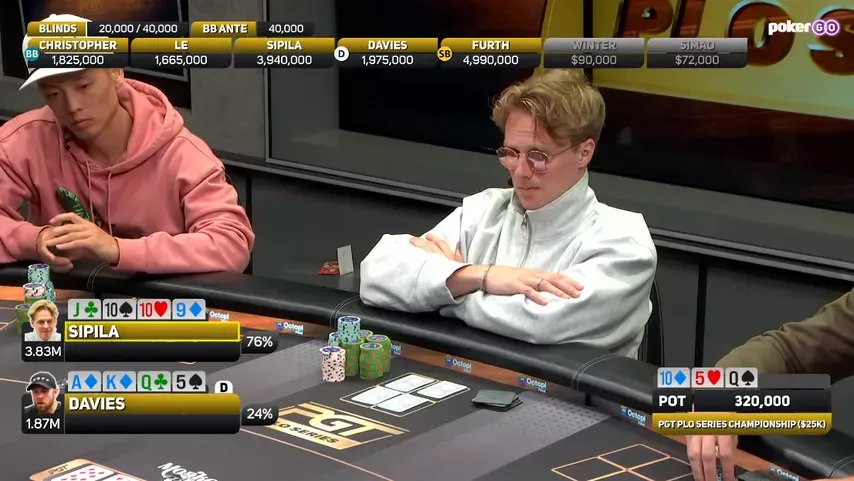
Preflop, Sipila raised to 110,000 and Davies called.
Nandez's analysis:
– Offsuit hands are bad to limp, but the raise here is good. Davies could call or 3-bet because he has excellent blockers. His hand flops more or less, but there is a chance not to bring things to a flop, represent aces and force the opponent to give up right away. However, I don’t see anything wrong with calling in position.
Sipila bet 150,000 on a texture on which, in general, he should not often continue aggression without a position. Davies called pretty quickly.
On the blank turn The Finn put 425,000 into the pot of 620,000. With two pair and the nut gutshot, Davies sighed and called.
Fell on the river . Sipila quickly checked, and Davies thought for a long time whether it was time to turn the hand into a bluff, but still gave up and checked after him.
Chip leader strategy:
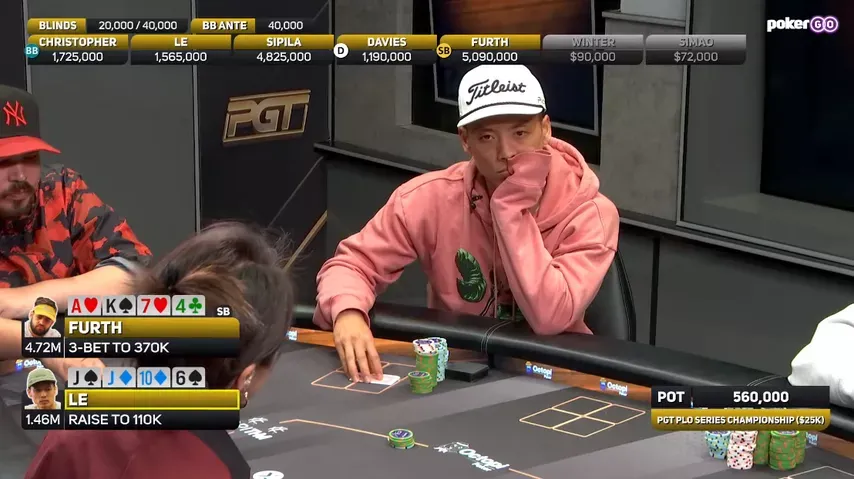
One of the short stacks (albeit quite a decent depth) opens up the entire table, and we have a blocker for aces. 3-bet!
Le had to give up.
By the way, Allan Le won the very first tournament of the series, beating Bryce Yockey heads-up. At the final table of that tournament there were such disjoint entities as Fernando Habegger and Steve Zolotov (born in 1945, the first entry in HendonMob dates back to 1984).
In the next hand, it looked like Furth had outplayed his hand. In a once-raised pot, the depth was perhaps too large for fielding a pair without a redraw, and matching a three-of-a-kind was more of a hindrance than a help.
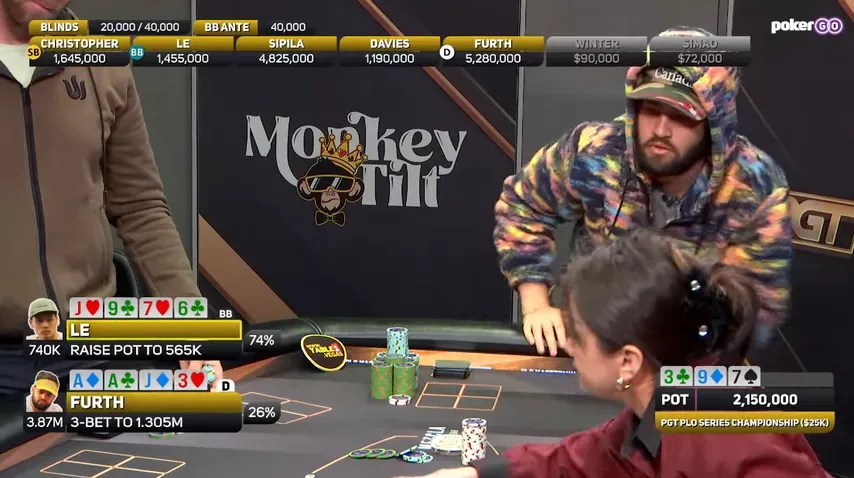
Two blanks on the turn and river, and Allan Le makes an important double.
Exhibition:
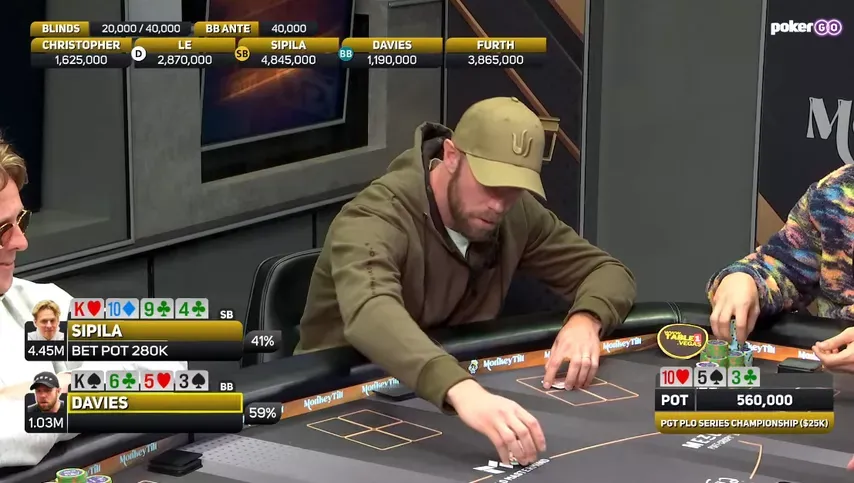
Preflop, Sipila correctly raised the short stack: according to Nandez, the opening range in this case is close to one hundred percent. It was impossible to call with Davies' hand, but the American had a different opinion.
The all-in on the flop ended in Davies' favor.
Chip Leader Showdown:
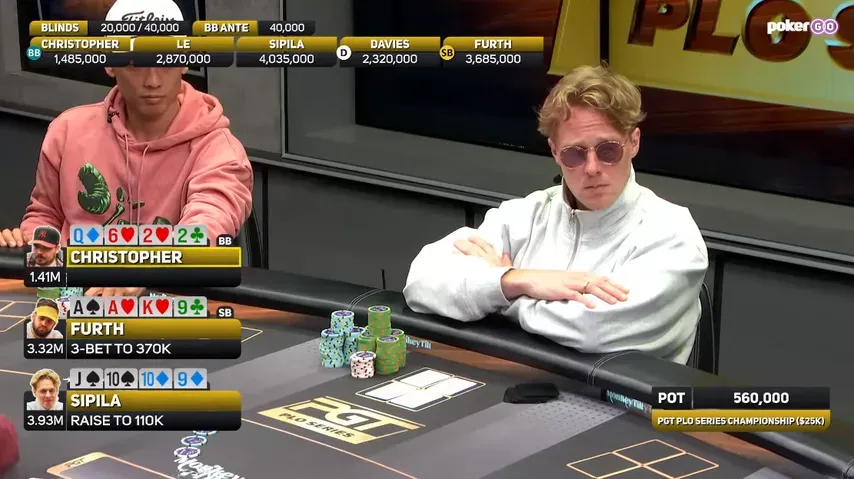
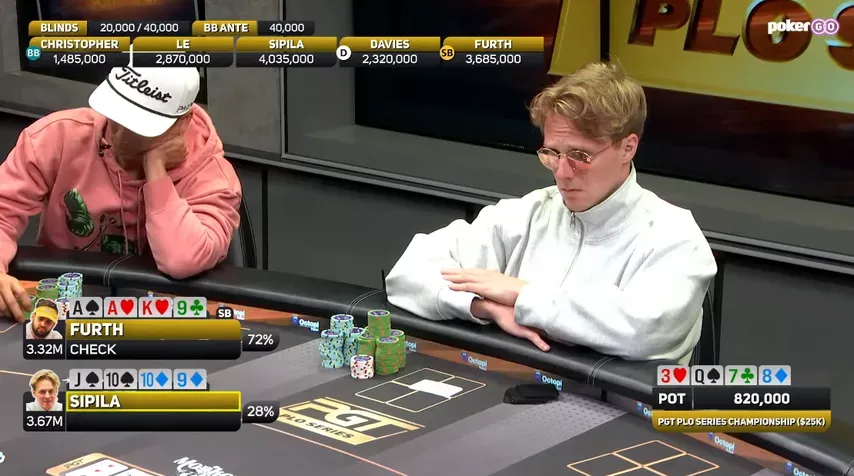
The flop was checked, and on the turn Sipila did not bluff, deciding that he would not knock out aces or kings, but beat the rest of his hands anyway. Check next and realize equity.
Repeat seven on the river, two more checks. Neat play on both sides.
“It’s clear that both players understand ICM well,” Nandez concluded. – In a cash game, the hand would be played differently.
Chip leader strategy:
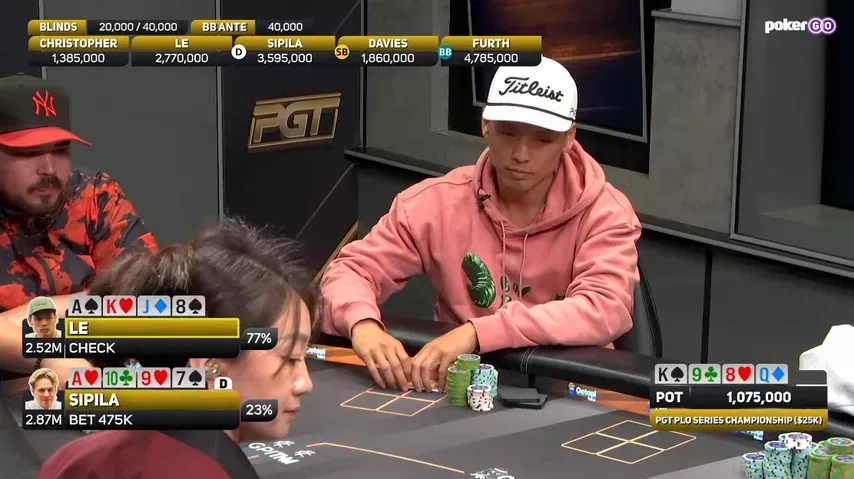
Sipila put two barrels on a double-sided pair. Le had a very hard time on the turn, but he made a choice that the commentators approved – he called. Still, there are outs for full and there is an important blocker – the jack.
However, the river turned out to be extremely unlucky for Allen – the six gave Sipila a straight with which he could draw.
Finn bet 950,000 into a pot of 1,550,000.
– It’s very hard to notice that not a form,” Nandez assured. – You only think about the straight with jack and ten, and you can lose sight of . But We don't block.
After thinking a little, Le called and lost a huge and very disappointing pot.
“This call also shows a lot of respect for the opponent’s skill,” Nandez added. – If we pay three streets for two pairs, it means we are convinced that our opponent will find all the necessary bluffs. And this respect, in my opinion, is well deserved.
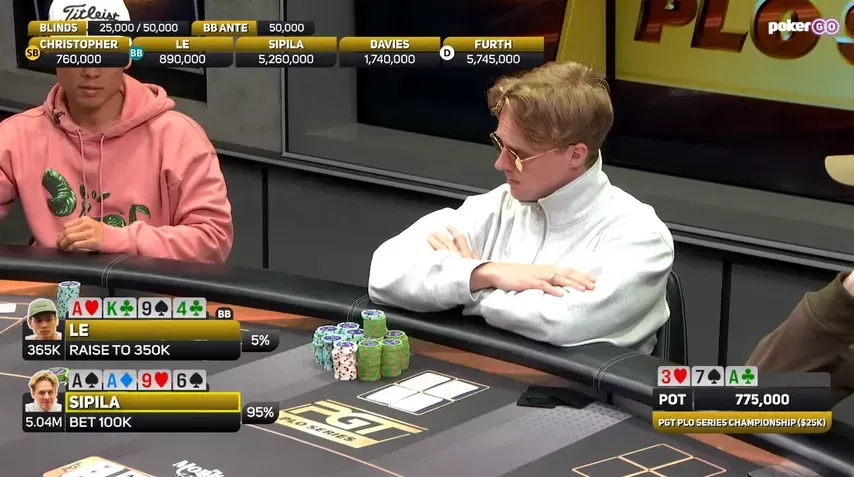
Preflop – raise and call
– The raise is very small! If we were Silipa, would we want to go all-in here? Or will it give your opponent a chance to fold? – asked Remko.
– I’m sure that all-in is not considered here. You can just call, because we are not afraid of a single turn, and playing for a stack in such depth will not be difficult,” Nandez replied.
Sipila called pretty quickly.
Came out on the turn , Le made another bet for almost the entire stack, paid for the all-in and left the table as soon as he saw his opponent’s cards. The prize for 5th place was $126,000.
“He played the hand absolutely correctly,” Nandez concluded. – Just very unlucky.
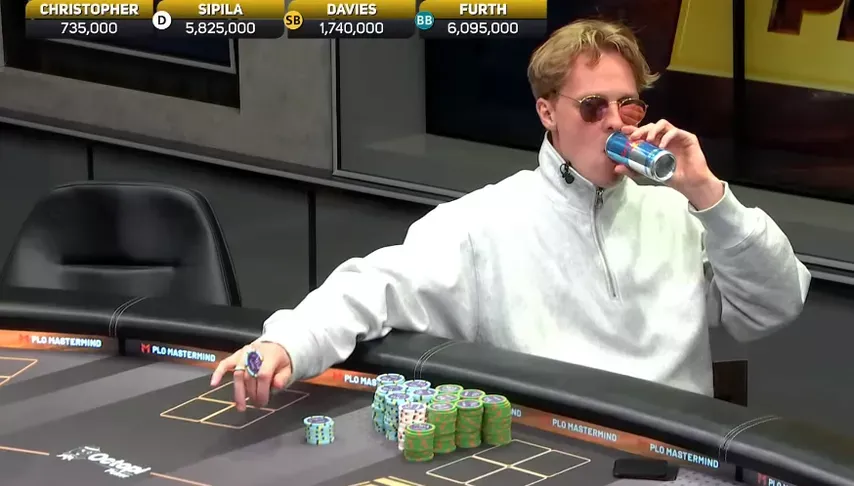
Davies Revival:

Preflop, Davies came under Sipila's raise, and the BB delivered. All three checked the flop, Furth bet on the turn and river, and Davies check-called. Furth's bet on the river is a little surprising: why was he going to get the deal? Well, Davies did everything right: why raise on the river when we only have the fourth nuts?
At the beginning of a new level, Stefan Christopher lost his patience. When the second chip leader opens into the big blind of the first, and we have 12 blinds and a rather weak ace, there is no need to 3-bet.
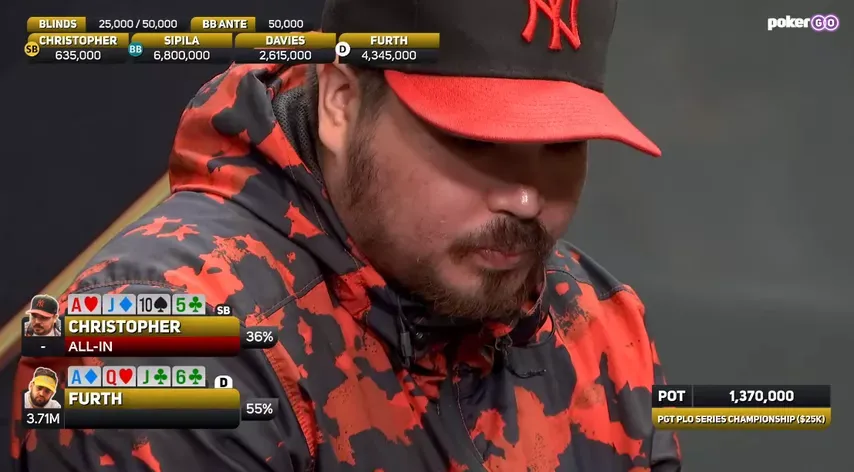
Furth held on and there were three left in the game. Christopher's prize was $171,000.
The 3-max lasted almost two hours, and the heads-up lasted more than two hours. We will not be able to dwell on all the interesting hands of this confrontation and invite fans of tournament Omaha to watch the video, especially since it was adorned with competent comments from Fernando Habegger. We will highlight only a few beautiful bluffs and key moments that decided the outcome of the tournament.
Furth limps preflop, Sipila checks to the BB.

Aggressive raise!
– Not a bad game: we block and we knock out a lot of hands if Furth bets too wide here,” says Nandez. – Of course, in this particular situation there will be no pass, but it was played quite well.
Furth calls.
Turn – . Furth checks. Sipila decides to continue his story with a flopped straight and bets the second barrel – a full pot.
Your opponent calls again.
Another blank arrives on the river.

And Sipila bluffs with a bet of 2/3 of the pot!
Furth looks at him incredulously and plunges into thought.
– The fact that he has diamonds is actually not as bad as it seems. Because when Sipila himself does not have diamonds, he is obliged to bluff. Therefore, the presence of a diamond strengthens our bluff catcher,” explains Nandez. – We have two pair, we block a straight, our opponent represents Finland – there are plenty of reasons to call!
And yet, Furth, after thinking about it for about three minutes, sends the cards to pass.
Seth Davies raises from the button with offsuit , Sipilya defends the BB with
Flop (510,000):
Check – check.
Turn (510,000):
Both check again.
River (510,000):
Sipila blockbet 175,000 with a weak flush.

Davies explodes with a powerful bluff with a ton of useful blockers. The pass from the Finn follows immediately.
The fate of third place was determined in the cooler:


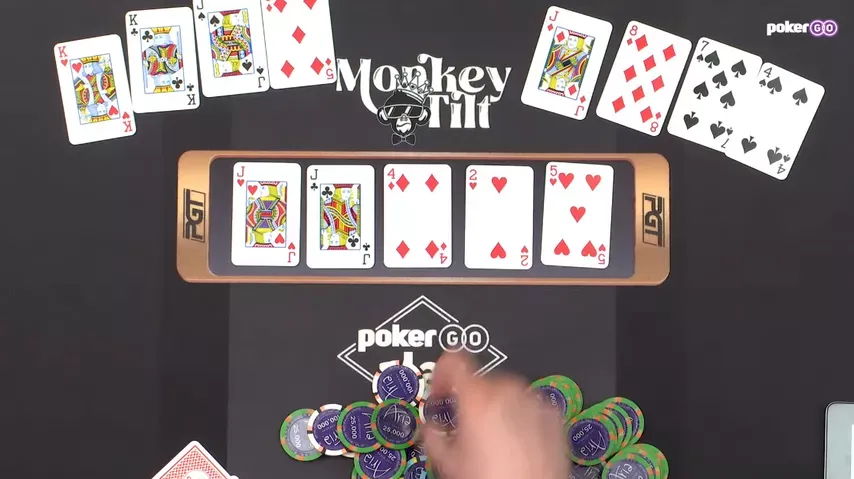
Boom! Bruno Furth is knocked out.
Stacks at the beginning of heads-up: 8,170,000 for Sipil, 6,225,000 for Davies.
Throughout the final table, Seth Davies' sticky style caused the Finnish regular his biggest problems. Sipila constantly missed the mark with bluffs against him. In heads-up, the situation has not changed.

First 4-bet pot in HU:


And on a continuation bet the size of a full pot, Sipila makes the correct, albeit very nasty, pass. Poor timing of a good 3-bet and Davies goes far ahead with 9.5 million versus 4.9 million.
Finally, the Finn managed to win a 3-bet pot with a bluff: after checking the flop twice, he took advantage of the dangerous board texture and successfully attacked with a flush draw.

But even here Davies frowned and clearly felt something. He folded with obvious reluctance.
Winning this hand allowed Sipila to develop the initiative. He picked up several more small pots with and without cards and for the first time in a long time, he took the lead.
Then, the players were given a cooler.

Sipila raised preflop and bet half the pot on the flop. Having been called on the flop and strengthened on the turn, the Finn...checked. The river came with a straight five and both players checked. The pot went to Davies, but Sipila definitely dodged the bullet.
However, no one can fool the poker gods. If they want blood, blood must be shed.

Not 3-betting this hand is a crime, but the timing is again not the best.
Opponent Sipila called his 4-bet and called all-in on the flop . Four outs did not come twice. The Finn has only 2,300,000 left – 15 blinds.
Limp call preflop, pot bet, and all-in on the flop.

The turn is a brick and the river is a king! The fight flares up with renewed vigor.
Limp call from Davies on the flop.

Davies simply calls his opponent's small bet.
Turn – check – check.
River – . Left without timebanks, Sipila bets 600,000. Davies thinks for about a minute and raises plus the pot.
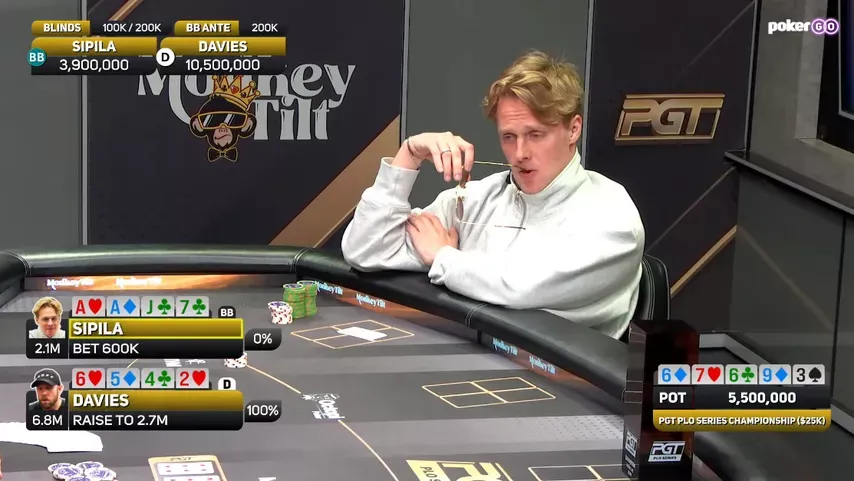
“Good bluff,” says the Finn and gives up. He has 10 blinds left.

In a single-raise pot, the flop sees Sipila leading a full pot with a combo draw, and Davies suddenly decides to play for the stack.

22 outs twice! Almost a full deck.
But even they are not enough against this man:

Turn – . Before the river, Sipila is still a 55% favorite.
River – another five.

Seth Davies cashes in an Omaha tournament for the first time in his life and immediately takes home $522,000 for first place in the main event, and even beats the best player in the series heads-up.
“Come on, I just got flops in all 3-bet and 4-bet pots,” he turned to his opponent, patting him on the shoulder. – Maybe we can go somewhere and get a beer?
Samuli Sipila's result in the PGT PLO series:









